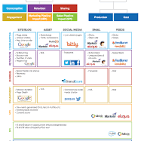The Importance of a Robust Content Marketing Strategy
In today’s digital landscape, content marketing has emerged as a cornerstone for successful brand communication. A well-crafted content marketing strategy not only drives engagement and builds trust with your audience but also enhances your brand’s visibility and authority. This article explores the key elements of an effective content marketing strategy and why it is essential for businesses of all sizes.
Understanding Content Marketing Strategy
A content marketing strategy is a plan that outlines how to use content to achieve your business goals. It encompasses everything from planning, creation, distribution, and measurement of content to attract, engage, and retain a clearly defined audience. The ultimate aim is to drive profitable customer action.
Key Components of an Effective Strategy
- Define Your Goals: Start by identifying what you want to achieve with your content. Whether it’s increasing brand awareness, generating leads, or boosting sales, clear objectives will guide your strategy.
- Know Your Audience: Understanding your target audience is crucial. Create detailed buyer personas to tailor content that addresses their needs, preferences, and challenges.
- Create Valuable Content: Focus on producing high-quality content that provides real value to your audience. This could be in the form of blog posts, videos, infographics, or podcasts.
- Select the Right Channels: Determine where your audience spends most of their time online and distribute your content on those platforms for maximum reach and impact.
- Measure and Optimise: Use analytics tools to track the performance of your content. Monitor metrics such as engagement rates, conversions, and traffic sources to refine your strategy continually.
The Benefits of Content Marketing
An effective content marketing strategy offers numerous benefits:
- Improved SEO: Regularly updated quality content helps improve search engine rankings by providing fresh information that search engines favour.
- Brand Authority: By consistently delivering valuable insights and information, you establish yourself as an authority in your industry.
- Customer Loyalty: Engaging content fosters trust and builds long-term relationships with customers who are more likely to remain loyal to your brand.
- Cost-Effective Marketing: Compared to traditional advertising methods, content marketing is often more affordable while yielding higher returns over time.
The Future of Content Marketing
The landscape of content marketing continues to evolve with advancements in technology such as artificial intelligence (AI) and data analytics. These tools enable marketers to create personalised experiences at scale while gaining deeper insights into consumer behaviour. Staying ahead in this dynamic environment requires agility and a commitment to continuous learning and adaptation.
An effective content marketing strategy is essential for any business looking to thrive in today’s competitive market. By understanding its core components and benefits—and embracing new technologies—businesses can craft compelling narratives that resonate with their audiences now more than ever before.
Essential FAQs on Crafting and Measuring a Successful Content Marketing Strategy
- What is a content marketing strategy?
- Why is a content marketing strategy important for businesses?
- How do you create an effective content marketing strategy?
- What are the key components of a successful content marketing strategy?
- How can businesses measure the success of their content marketing strategy?
- What are the benefits of implementing a robust content marketing strategy?
What is a content marketing strategy?
A content marketing strategy is a comprehensive plan that outlines how businesses use content to achieve their marketing objectives. It involves the creation, distribution, and measurement of valuable and relevant content to attract and engage a specific target audience. By defining clear goals, understanding the audience’s needs, creating high-quality content, selecting appropriate distribution channels, and continuously analysing performance metrics for optimization, a content marketing strategy serves as a roadmap for brands to effectively communicate their message, build brand awareness, establish authority in their industry, and drive profitable customer action.
Why is a content marketing strategy important for businesses?
A content marketing strategy is crucial for businesses as it serves as a roadmap to effectively engage with their target audience, build brand awareness, and drive profitable customer actions. By defining clear goals, understanding the audience’s needs, and creating valuable content tailored to their preferences, businesses can establish themselves as industry authorities and foster long-term relationships with customers. A well-crafted strategy not only enhances brand visibility but also boosts SEO performance, increases customer loyalty, and provides a cost-effective alternative to traditional advertising methods. In today’s digital age, where content is king, a robust content marketing strategy is key to staying competitive and relevant in the ever-evolving landscape of business communication.
How do you create an effective content marketing strategy?
To create an effective content marketing strategy, start by clearly defining your goals and target audience. Understanding the needs and preferences of your audience is crucial for crafting content that resonates with them. Conduct thorough research to identify relevant topics and keywords that align with your brand’s message. Develop a content calendar to plan and organise your content creation efforts effectively. Consistently monitor and analyse the performance of your content using metrics such as engagement rates and conversions to make data-driven adjustments and optimise your strategy for maximum impact. Remember, a successful content marketing strategy is a dynamic process that requires continual refinement based on insights gathered from audience interaction and market trends.
What are the key components of a successful content marketing strategy?
When it comes to crafting a successful content marketing strategy, several key components play a vital role in driving its effectiveness. Firstly, defining clear and measurable goals is essential to guide the direction of the strategy and assess its impact. Understanding the target audience through detailed buyer personas helps tailor content that resonates with their needs and preferences. Creating valuable and engaging content across various formats and channels ensures maximum reach and engagement. Regularly monitoring and analysing performance metrics allows for continuous optimisation and refinement of the strategy to achieve desired outcomes. Overall, a successful content marketing strategy hinges on strategic goal-setting, audience understanding, compelling content creation, effective distribution, and data-driven refinement.
How can businesses measure the success of their content marketing strategy?
One frequently asked question in the realm of content marketing strategy is how businesses can measure the success of their efforts. The effectiveness of a content marketing strategy can be gauged through various key performance indicators (KPIs) such as website traffic, engagement metrics (like time spent on page, bounce rate, and social shares), lead generation, conversion rates, and return on investment (ROI). By analysing these metrics using tools like Google Analytics, social media insights, and CRM systems, businesses can gain valuable insights into the impact of their content and make data-driven decisions to optimise their strategy for better results.
What are the benefits of implementing a robust content marketing strategy?
Implementing a robust content marketing strategy offers a multitude of benefits for businesses seeking to enhance their online presence and engage with their target audience effectively. By creating valuable and relevant content, companies can improve their search engine rankings, establish themselves as industry authorities, foster customer loyalty, and drive cost-effective marketing campaigns. A well-executed content marketing strategy not only increases brand visibility but also boosts customer engagement and ultimately leads to higher conversion rates and long-term success in the competitive digital landscape.




